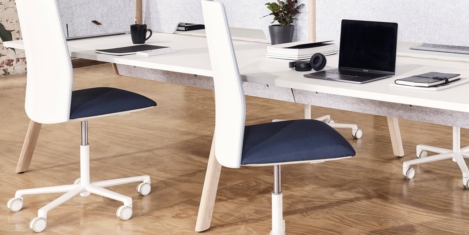To provide the best experiences, we use technologies like cookies to store and/or access device information. Consenting to these technologies will allow us to process data such as browsing behaviour or unique IDs on this site. Not consenting or withdrawing consent, may adversely affect certain features and functions.
The technical storage or access is strictly necessary for the legitimate purpose of enabling the use of a specific service explicitly requested by the subscriber or user, or for the sole purpose of carrying out the transmission of a communication over an electronic communications network.
The technical storage or access is necessary for the legitimate purpose of storing preferences that are not requested by the subscriber or user.
The technical storage or access that is used exclusively for statistical purposes.
The technical storage or access that is used exclusively for anonymous statistical purposes. Without a subpoena, voluntary compliance on the part of your Internet Service Provider, or additional records from a third party, information stored or retrieved for this purpose alone cannot usually be used to identify you.
The technical storage or access is required to create user profiles to send advertising, or to track the user on a website or across several websites for similar marketing purposes.
 The CIPD, the professional body for HR and people development, and Mind, the mental health charity, have today jointly published a revised mental health guide for managers to improve support for those experiencing stress and mental health issues at work. The updated guidance follows recent CIPD research which found that less than one in three organisations (32 percent) train line managers to support staff with poor mental health.
The CIPD, the professional body for HR and people development, and Mind, the mental health charity, have today jointly published a revised mental health guide for managers to improve support for those experiencing stress and mental health issues at work. The updated guidance follows recent CIPD research which found that less than one in three organisations (32 percent) train line managers to support staff with poor mental health.














 Built environment organisations are calling for urgent action on issues such as consumption, innovation and infrastructure to prevent the UK slipping behind other nations on poverty, equality and the environment as a new report released today (3 July 2018) highlights the UK’s inadequate performance against the United Nations Sustainable Development Goals (SDGs), including those for the built environment. The report, Measuring up, from the UK Stakeholders for Sustainable Development (UKSSD), is the first comprehensive assessment of the UK’s performance against all 17 SDGs and highlights a significant danger that quality of life in the UK will worsen if action is not taken. Just some of the findings of the report include; that the UK is performing well (green) on only 24 percent of its targets; no industry, innovation and infrastructure targets have achieved a ‘good’ performance rating, with gaps in policy coverage and inadequate or deteriorating performance and large scale, sustained investment in replacing ageing infrastructure and creating additional resilient and low carbon infrastructure of all kinds is required.
Built environment organisations are calling for urgent action on issues such as consumption, innovation and infrastructure to prevent the UK slipping behind other nations on poverty, equality and the environment as a new report released today (3 July 2018) highlights the UK’s inadequate performance against the United Nations Sustainable Development Goals (SDGs), including those for the built environment. The report, Measuring up, from the UK Stakeholders for Sustainable Development (UKSSD), is the first comprehensive assessment of the UK’s performance against all 17 SDGs and highlights a significant danger that quality of life in the UK will worsen if action is not taken. Just some of the findings of the report include; that the UK is performing well (green) on only 24 percent of its targets; no industry, innovation and infrastructure targets have achieved a ‘good’ performance rating, with gaps in policy coverage and inadequate or deteriorating performance and large scale, sustained investment in replacing ageing infrastructure and creating additional resilient and low carbon infrastructure of all kinds is required.


 Almost one in two working age adults currently lack numeracy skills and this skills gap is estimated to cost businesses £3.2bn annually, with a cost to the UK economy of up to £20.2billion a year. This is why charity National Numeracy has joined together with founder supporter, KPMG, to establish the first ever UK National Numeracy Day – created to drive a change in recognition of the importance of numbers, as well as improve employee careers. The day, which takes place on the 16th May will be designed to celebrate numbers, and aims to help individuals to check their numeracy levels, and provide free tools to support improvement amongst those who could benefit. Businesses are being called on to get involved in a variety of ways; from becoming an official supporter, to encouraging employees, suppliers and the local community to check their numeracy levels using the
Almost one in two working age adults currently lack numeracy skills and this skills gap is estimated to cost businesses £3.2bn annually, with a cost to the UK economy of up to £20.2billion a year. This is why charity National Numeracy has joined together with founder supporter, KPMG, to establish the first ever UK National Numeracy Day – created to drive a change in recognition of the importance of numbers, as well as improve employee careers. The day, which takes place on the 16th May will be designed to celebrate numbers, and aims to help individuals to check their numeracy levels, and provide free tools to support improvement amongst those who could benefit. Businesses are being called on to get involved in a variety of ways; from becoming an official supporter, to encouraging employees, suppliers and the local community to check their numeracy levels using the 














